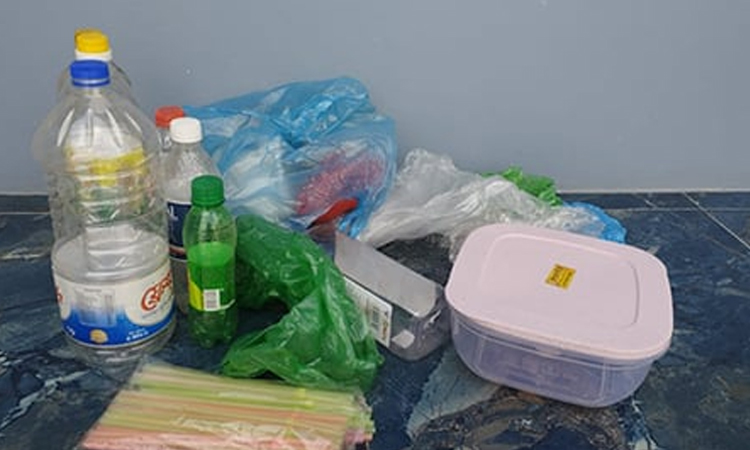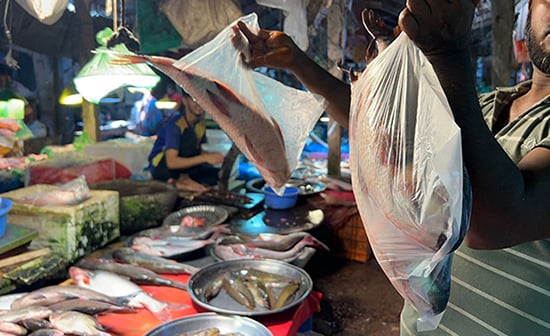News Flash

Salina Sultana
DHAKA, Aug 19, 2025 (BSS) - Plastic pollution is increasing gradually across the world. Different parts of nature are being damaged every day. Despite various steps, programmes and plans, effective solutions have not yet been implemented to protect the environment.
Experts believe that adopting alternatives to the use of plastic is the only way to protect the environment. Environmental conservation and pollution prevention are being prioritised to increase global awareness.
Recently, during the celebration of the World Environment Day-2025, the message of environmental awareness was specially promoted.

The United Nations Environment Programme (UNEP) set 'Ending Plastic Pollution' as the theme of this year's World Environment Day. This slogan has been promoted at the local level as "It is time to stop plastic pollution".
Marking the World Environment Day, different events gave special emphasis on reducing plastic waste, recycling and using sustainable alternatives.
Bangladesh is also playing an active role in this initiative. Chief Adviser to the interim government Professor Muhammad Yunus at the opening ceremony of the World Environment Day said: "We all are here who are responsible for the destruction of the world. We are the accused."
Prof Yunus said the use of plastic has increased three types of crises in the world - climate crisis, natural crisis and loss of biodiversity. Plastic is not only leading the environment but also the biodiversity of the world to the path of destruction, he said.
He said, "For lack of proper plastic management, the world's waterbodies are being filled with polythene and other plastics. As a result, biodiversity is facing destruction. Plastic is a material that has birth but no death. It is increasingly spreading destruction and pollution in the environment. If we do not change our lifestyle, the defeat of humanity is inevitable."
The Chief Adviser also said plastic is harmful to the environment. "It is harmful not only to humans but also to all living things on earth. The world's population is increasing and with it the per capita use of plastic is increasing. From today, we have to decide from our hearts that we will quit plastic use."
"If every citizen of the country avoid single-use plastic at least once a week, then it will be possible to cut plastic use step by step. However, this requires strong determination. It is difficult to cross this path without determination."
Environment, Forest and Climate Change Syeda Rizwana Hassan said her ministry has taken various effective steps to prevent environmental pollution after joining the ministry.
Initiatives to prevent the use of single-use plastic at the secretariat, limiting the use of plastic in shopping malls, retail markets and raw markets are notable among such initiatives, she said.
In addition, she said, Bangladesh has strongly rejected the draft of the Global Plastics Agreement proposed in the second phase of the International Conference on Plastic Pollution held in Geneva, Switzerland, on August 13, 2025.
Bangladesh stated that the draft is weak and inadequate. It does not include the full life cycle of plastics, health effects, harmful chemicals, waste management priorities and mandatory measures to prevent transboundary pollution.
Rizwana Hasan said, "Everyone must take collective initiatives to control plastic pollution. The Extended Producer Responsibility (EPR) guidelines for plastic waste management need to be implemented. If all levels of our society are aware of, it will be possible to check plastic pollution."
Md Alamgir Kabir, General Secretary of Bangladesh Poribesh Andolon (BAPA), said the ban on polythene is not being effectively implemented in Bangladesh.
A 2019 study showed that about 87,000 tonnes of single-use plastic are used in Bangladesh every year, of which 96 percent is directly dumped into the environment. The remaining 4 percent is deposited in landfills. The presence of plastic has also been detected in rivers, canals and the sea.
Alamgir said, "Polythene does not break down easily. When burned, it releases carbon monoxide, dioxin and furan, which cause various diseases, including cancer, in the human body. It takes 400-700 years to mix with the soil. The fertility of agricultural land is decreasing, while the presence of microplastics has been detected in fish. Therefore, we have to be aware of and start working to eliminate plastic from our families and daily lives."
Dr Ishrat Nazia, Chairman of the Department of Geography and Environment at Dhaka University, said polythene causes health risks, waterlogging and disruption of life.
"Plastic has not been mixed with the soil for hundreds of years. The collective efforts of everyone are necessary for the safety of our present and future generations," he said.
Single-use plastic was banned in Bangladesh in 2002. Some 17 single-use plastic items were identified in 2024 but the ban on these items has not been effective yet despite having efforts to raise public awareness.
According to the data of the World Bank, the average per capita plastic consumption worldwide is 35 kg, while it is only less than 5 kg in Bangladesh.
Bangladesh is taking forward the international and local initiatives taken to protect the environment in a coordinated manner. However, to achieve success, every citizen must become aware of pollution and start working to avoid plastic in their daily life.